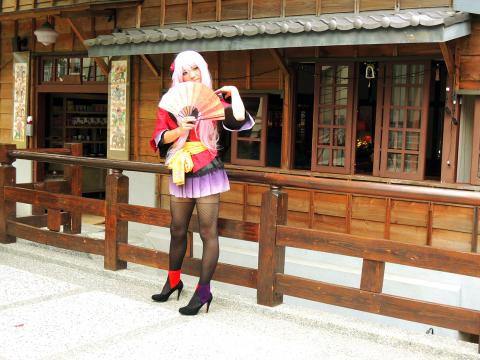A wooden building called Liuwu (柳屋) in Greater Tainan’s Jhongsi District (中西) has become a popular site for cosplay enthusiasts who like posing in costumes for pictures in traditional Japanese-style surroundings.
On weekends, small crowds of cosplay enthusiasts dressed as various Japanese manga characters can be seen posing for pictures in front of the Liuwu, or the Shihpamao Tea House, the name given it by its new operator, Yeh Tung-tai (葉東泰).
Cosplay, or costume play, is a type of performance art that originated in Japan in which participants wear costumes and accessories to portray a specific character, mostly from animations, caricatures or video games.

Photo: Meng Ching-tzu, Taipei Times
The city’s National Cheng Kung University has long been a famous gathering point for cosplay devotees in southern Taiwan, but it is gradually being overtaken by the Liuwu.
Yeh said that the Liuwu — a former dinning hall for the Japanese that was built around 1934 — was unlike other traditional Japanese-style structures whose wooden beams were normally left unpainted to preserve their original color and grain.
Brown paint was applied to the beams used to construct the Liuwu, Yeh said, mainly to help preserve the wood in Taiwan’s humid weather.
“To most Taiwanese, the Liuwu may appear to be no different from any other traditional Japanese building, but a Japanese could easily discern the subtle Taiwanese flavor incorporated in the building,” Yeh said.
While Tainan, a former capital of Taiwan, has a rich nostalgic atmosphere, it must be infused with an innovative spirit, rather than simply dwelling on the past, to keep pace with modern society, Yeh said.
In an effort to bring in innovations to his tea house, Yeh has launched a tea-tasting set featuring two pottery tea cups larger than ordinary ones. One is termed the “scent cup” (聞香杯), while the other is called the “sample teacup (品茗杯)” — affording customers a different experience of tea appreciation.
The scent cup, also known as the sniffle cup, is designed for tea enthusiasts to appreciate the aroma of infused tealeaves, while the sample teacup is used for drinking.

CHANGING LANDSCAPE: Many of the part-time programs for educators were no longer needed, as many teachers obtain a graduate degree before joining the workforce, experts said Taiwanese universities this year canceled 86 programs, Ministry of Education data showed, with educators attributing the closures to the nation’s low birthrate as well as shifting trends. Fifty-three of the shuttered programs were part-time postgraduate degree programs, about 62 percent of the total, the most in the past five years, the data showed. National Taiwan Normal University (NTNU) discontinued the most part-time master’s programs, at 16: chemistry, life science, earth science, physics, fine arts, music, special education, health promotion and health education, educational psychology and counseling, education, design, Chinese as a second language, library and information sciences, mechatronics engineering, history, physical education

The High Prosecutors’ Office yesterday withdrew an appeal against the acquittal of a former bank manager 22 years after his death, marking Taiwan’s first instance of prosecutors rendering posthumous justice to a wrongfully convicted defendant. Chu Ching-en (諸慶恩) — formerly a manager at the Taipei branch of BNP Paribas — was in 1999 accused by Weng Mao-chung (翁茂鍾), then-president of Chia Her Industrial Co, of forging a request for a fixed deposit of US$10 million by I-Hwa Industrial Co, a subsidiary of Chia Her, which was used as collateral. Chu was ruled not guilty in the first trial, but was found guilty

Taiwan-based publisher Li Yanhe (李延賀) has been sentenced to three years in prison, fined 50,000 yuan (US$6,890) in personal assets and deprived political rights for one year for “inciting secession” in China, China's Taiwan Affairs Office spokesman Chen Binhua (陳斌華) said today. The Shanghai First Intermediate People’s Court announced the verdict on Feb. 17, Chen said. The trial was conducted lawfully, and in an open and fair manner, he said, adding that the verdict has since come into legal effect. The defendant reportedly admitted guilt and would appeal within the statutory appeal period, he said, adding that the defendant and his family have

DEADLOCK: As the commission is unable to forum a quorum to review license renewal applications, the channel operators are not at fault and can air past their license date The National Communications Commission (NCC) yesterday said that the Public Television Service (PTS) and 36 other television and radio broadcasters could continue airing, despite the commission’s inability to meet a quorum to review their license renewal applications. The licenses of PTS and the other channels are set to expire between this month and June. The National Communications Commission Organization Act (國家通訊傳播委員會組織法) stipulates that the commission must meet the mandated quorum of four to hold a valid meeting. The seven-member commission currently has only three commissioners. “We have informed the channel operators of the progress we have made in reviewing their license renewal applications, and